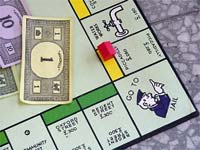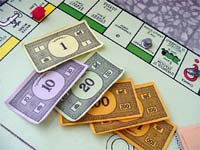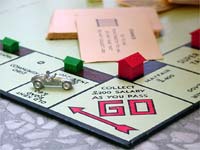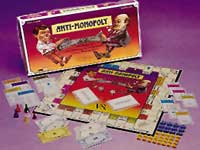Unleashing the inner capitalist within us all
 Monopoly is, quite simply, the most successful board game in history. More than 200 million Monopoly sets have been sold in over 80 countries and 26 languages over the last seven decades.
Monopoly is, quite simply, the most successful board game in history. More than 200 million Monopoly sets have been sold in over 80 countries and 26 languages over the last seven decades.
For many first-time visitors to London and Atlantic City, the cities honoured in the most popular versions of the game, walking the streets is like travelling through a real-life Monopoly world. Pall Mall, Mayfair, the Strand, Fenchurch Street, Bond Street and the Angel, Islington - to millions around the world these are Monopoly squares rather than real places.
A rich vernacular
The object of the game is to move around the virtual cityscape, acquiring property and extracting rents along the way. Little plastic houses increase the rent, but beware the pitfalls of Chance and Community Chest cards - worst among them, the dreaded jail.
The Monopoly lexicon has made a rich contribution to modern English. Expressions such as a �Get Out of Jail Free card�, �Do Not Pass Go, Do Not Collect �200� and �Landing on Park Lane� are colourful idioms that have entered the vernacular.
Some players like to draw deep psychoanalytical conclusions from a player�s taste in Monopoly piece - choosing the car, iron, boat, top hat, dog or boot supposedly holds deep implications for your character and personality.
Buying the property
Despite its status as wholesome family fun, Monopoly�s history is riddled with controversy.
 Officially, Monopoly was invented in 1933 by an unemployed salesman, Charles Darrow, who drew the first board on his kitchen table-cloth. Square names were apparently based on Darrow�s childhood memories of Atlantic City, hence the famously misspelled name of �Marvin Gardens� (a formal apology was issued to the residents of Marven Gardens in 1995).
Officially, Monopoly was invented in 1933 by an unemployed salesman, Charles Darrow, who drew the first board on his kitchen table-cloth. Square names were apparently based on Darrow�s childhood memories of Atlantic City, hence the famously misspelled name of �Marvin Gardens� (a formal apology was issued to the residents of Marven Gardens in 1995).
In 1934 Darrow offered the game to a leading entertainment company, Parker Bros, which rejected the prototype because it apparently contained "fifty-two fundamental errors".
Undaunted, Darrow printed 5,000 copies of Monopoly and began to sell it under his own steam. The game was a hit in local stores, prompting Parker Bros to return in 1935 to buy the rights and make Monopoly into the fastest selling board game in America.
Extracting the rent
Monopoly has endured as a hit for more than six decades, with variations such as a Braille edition and even the $600 all-chocolate Monopoly set created in 1978 by the Neiman Marcus department store.
The tried and true formula has changed little, although metal shortages during the Second World War forced a temporary switch to wooden playing pieces. A player poll in 1998 found the racing car was the most popular token, and the same fans voted for a sack full of cash as the first new token in decades.
Community chest?
That�s the official story of Monopoly. Behind the scenes, however, lurks a far murkier tale.
 Evidence uncovered in recent years tends to suggest that Darrow in fact merely formalised a game that had existed for several decades. Perhaps the earliest forebear dates back to 1904, when a Quaker woman from Virginia, Elizabeth J Magie, was granted a patent over a board game. Her game was invented to demonstrate a distinctly un-capitalist theory about how increases in land value benefited only a small minority of landlords at the expense of the renting majority.
Evidence uncovered in recent years tends to suggest that Darrow in fact merely formalised a game that had existed for several decades. Perhaps the earliest forebear dates back to 1904, when a Quaker woman from Virginia, Elizabeth J Magie, was granted a patent over a board game. Her game was invented to demonstrate a distinctly un-capitalist theory about how increases in land value benefited only a small minority of landlords at the expense of the renting majority.
Magie�s game spread through the disparate Quaker communities of the eastern United States, along the way changing its name from �The Landlord�s Game� to �Auction Monopoly� and eventually just �Monopoly�.
As early as the 1920s, a man named Dan Layman produced a commercial version of the game after encountering Magie�s game at college. Layman�s game was called �Finance�, because his legal advice suggested that the name �Monopoly� could not be protected because of the earlier game.
A friend of Layman�s explained the game to one Ruth Hoskins, who moved to Atlantic City in 1929 and claims to have made a version with street names from the New Jersey city in late 1930. Friends of Hoskins apparently demonstrated the game to a hotel manager from Germantown, Pennsylvania. This couple then introduced the game to Esther Darrow, who had lived next door before marrying Charles Darrow.
Go directly to jail
In 1931, Louis Thun - who had earlier explained the game to his college roommate, Dan Layman - attempted to patent his own board game. But the application was withdrawn after the 1904 patent was uncovered, prompting Thun to copyright a set of rules that included Community Chest and the $50 get-out-of-jail impost.
 These antecedents were uncovered after 1974 when the new owners of Parker Bros brought a law suit against Ralph Anspach, an economics professor who invented a board game called �Anti-Monopoly�.
These antecedents were uncovered after 1974 when the new owners of Parker Bros brought a law suit against Ralph Anspach, an economics professor who invented a board game called �Anti-Monopoly�.
It was revealed that Parker Bros paid just $500 to buy out the original game from Lizzie Magie, who received none of the millions of dollars of royalties Darrow received. The games company had also acquired the games sold by Dan Layman and Louis Thun.
Anspach mortgaged his own house to fight the case, and things looked destined for a sad conclusion when a court ordered 40,000 copies of Anti-Monopoly to be buried in landfill. But in 1984 the US Supreme Court handed an epic victory to the professor from San Francisco, who sold half a million copies of his game within a year.
In more ways than one, Monopoly is a vivid representation of how capitalism works - part luck, part greed and part accident of history.
